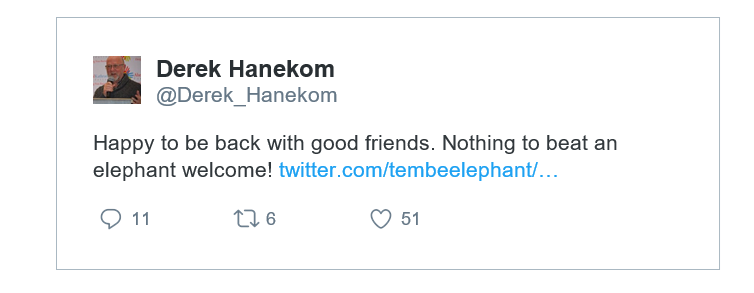The tourism industry has reacted positively to the news of President Cyril Ramaphosa’s reinstatement of Derek Hanekom as South Africa’s Minister of Tourism, with expectations of the Minister already set, such as the implementation of electronic visas (e-visas).
CEO of the Southern Africa Tourism Services Association (Satsa), David Frost, commented on Hanekom’s reinstatement: “We are massively enthusiastic about the Minister coming back; he brings a level of leadership and wisdom to the industry.”
The decision to re-appoint Hanekom confirms the President’s commitment to place tourism at the centre of economic growth in SA, says Mmatšatši Ramawela, CEO of the Tourism Business Council of Africa (TBCSA. “Hanekom’s appointment allows for continuity as he is already familiar with the sector, the various role-players and its dynamics, and has a firm understanding of what is required to lead the sector to double-digit growth in line with the bold vision of the National Tourism Sector Strategy.”
This optimistic reaction was echoed by Alan Winde, Minister of Economic Opportunities, and James Vos, MP Shadow Minister of Tourism, who have welcomed Hanekom back to the tourism portfolio.
“As President Ramaphosa said in his State of the Nation Address (SONA), tourism employs 700 000 people in this country. By focusing on growing this sector, Minister Hanekom and his department have the opportunity to seed the emergence of entrepreneurs across the hospitality value chain,” says Winde.
This comes as an opportunity to turn around the issues created for the tourism industry by recently re-appointed Minister of Home Affairs, Malusi Gigaba in the visa debacle, during his last turn at Home Affairs, where he inherited the label ‘tourism terminator’.
Winde would like to see Hanekom working closely with Home Affairs to better enable visitors to gain easy access to the country, with technology playing a key role.
“The use of technology in tourism is well established. Where e-visas have been implemented, they have proven to be effective,” commented Vos, who says that SA’s visa regulations continue to make it difficult for tourists to select SA as a destination due to its cumbersome visa application process.
“Minister Gigaba has been tasked with assisting President Ramaphosa to achieve the vision he detailed in his SONA address, of doubling the size of the tourism industry and creating more jobs across all sectors. This can only be done by ensuring that the red tape around the issuing of visas to tourists, and work permits to foreign investors, is urgently addressed,” said Winde.
Furthermore, Vos hopes to see the scrapping of unabridged birth certificates and the streamlining of visas to make the process easier and more efficient.
“We are confident that we can work through our Minister to further regulate the industry,” concludes Frost.
Paul Lynch, Owner of Inzolo Game Lodge in the Eastern Cape, says: “If he (Hanekom) has been given a directive from the presidency to increase tourism, then he will put things in place to improve SA’s international image, more so that it is safe to travel.”
Hanekom has held various roles in government, including Minister of Agriculture and Land Affairs (1994-1999), Deputy Minister of Science and Technology (2004-2012), Minister of Science and Technology (2012-2014), and Minister of Tourism (2014-2017).
On March 31, 2017 he was replaced by Tokozile Xasa, now Minister of Sport and Recreation, after filing a motion of no confidence against former President Jacob Zuma.
























